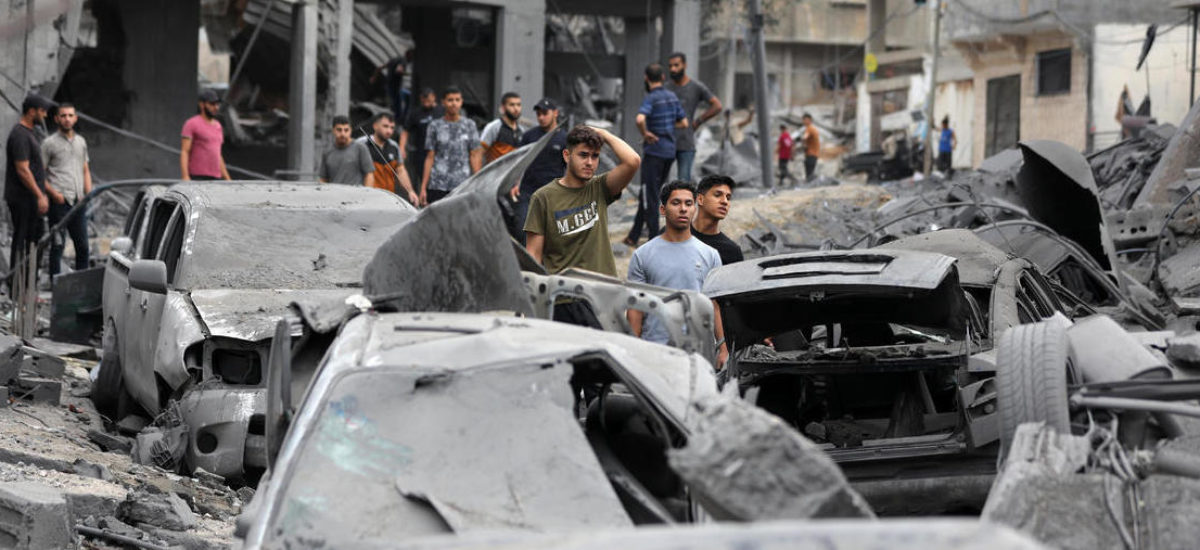Photo courtesy of CBS News
Israel’s Western allies, the US in particular, believe that any investigation into Israeli war crimes in the Gaza Strip will “exacerbate tensions” and “undercut efforts to advance a negotiated two-state solution.” I am quoting US Secretary of State Antony Blinken’s response to a request made by the Palestinian Authority to the International Criminal Court in 2021. However, such statements ignore the fact that Israel’s colonisation of Gaza is what stands in the way of any long term, meaningful solution.
The US liberal establishment are with Israel over its war with Hamas. On the face of it, it’s hard not to agree with their view. Hamas led the attack, after all, and Israel responded. But where are the critiques of the scale of Israel’s response, of the reasons for the attacks? Does the liberal establishment ever see the Gaza Strip? They see Taiwan, they see Hong Kong and they see Ukraine. Are the dispossessed of Gaza not worthy enough? When asked about the refugee crisis in Ukraine, Ukraine’s Prosecutor General told the BBC it saddened him to see people with “blue eyes and blond hair…being killed every day.” Is this why the dispossessed of Gaza have been ignored: because they don’t have blue eyes?
The West likes to impose its vision on the world on the Global South; it condemns human rights violations and asks governments to investigate them. When an Al-Jazeera journalist was killed by Israeli Defence Forces last year and the Israeli government responded to calls for investigations by stating that it would never allow its military to be put on trial, Washington did not see it fit to condemn or even comment. The killing of a journalist, an incident that would have compelled a flurry of condemnations had it occurred elsewhere, especially in countries like ours, has not led to any investigation.
It’s not that human rights bodies have ignored Gaza. They have not. Amnesty International, for instance, calls it “dispossession.” The numbers speak for themselves. Since 1967, Israeli governments, Labour and Likud, has appropriated more than 100,000 hectares of land, demolished more than 50,000 homes, and forced restrictions down the throats of five million Palestinians. In an Advisory Opinion in 2004, the International Court of Justice stated that Israel was obliged “to return the land, orchards, olive groves and other immovable property” seized from Palestinians. But Israeli forces control what Palestinians see, where they visit, the food they eat, the water they drink. This week they declared a state of siege: what Palestinians have been living under for the last 50 years.
If there is any tangible, flesh and blood example for the banality of evil, the Gaza Strip is it. Yet celebrities choose not to see Gaza. Some of them happen to be goodwill ambassadors for refugee and human rights bodies. Most of them parade themselves as harbingers of peace and unity. Like the US government, however, they issue one sided statements and remain tone-deaf to the root causes of the conflict in Palestine and Israel: ironic, given how they emphasise root causes behind conflicts elsewhere. They haven’t realised that the people of Gaza see Israel as an occupying force to be resisted. Very few see it beyond the surface. When the first Intifada unfolded, Edward Said called it “the most impressive and disciplined anti-colonial insurrection in this century.” He was right.
Not surprisingly, more so than Ukraine, it is solidarity with Palestine that has set the Global North apart from the South. China and Russia may be careful in wording press releases – both have called for de-escalation although certain officials have called for a resolution of the Palestinian question – but the rest of the Global South sees Israeli forces as Palestinians see them. All too often this cuts across political divisions. When violence broke out in the region in 2021, the Sri Lankan government and the opposition both condemned Israeli occupation of Gaza. Barring right wing Sinhala nationalist groups that frame Hamas’s recent attacks, wrongly, as Islamist violence, and pro-separatist political outfits that tweet in support of Israel – no doubt seeing it, again wrongly, as a minority state in need of defence – Sri Lanka has embraced solidarity with Palestine. This is as it should be.
Israel has historically been a beneficiary of US aid. That has propped it up as a technological hub in the region, a fact not lost on the US or is allies. Even China has entered the picture as Israel is a hidden spoke in the Belt Road Initiative wheel. But there are deeper dimensions to the conflict going beyond the geopolitics and the security implications. The roots of the crisis lie in the West’s inability to see Palestinians as equals to the Israelis, although the balance of power has always been in the latter’s favour. It is certainly easy to view Israel as the encircled state. But right throughout its history it has taken the upper hand. The liberal establishment has in nine cases out of 10 looked askance at these realities. And when someone from that circle takes a different line, he or she tends to be shut down.
We can choose to be on the right side of history here. Powerful states pursue their interests and they impose these on other states on the pretext of promoting certain values. Yet they are mum whenever those values clash with their own interests. The West’s silence over the Palestinians is thus not surprising. But as one official after another speaks for the Israeli state and pontificates on its right to exist, the people of Gaza continue to be bombarded into submission. For half a century, they have lived under siege. As Tariq Ali notes, “Western civilization seems willing to stand by while they are exterminated.” This cannot go on for any longer. If Israel has a right to exist, then Palestinians have a right to resist.

